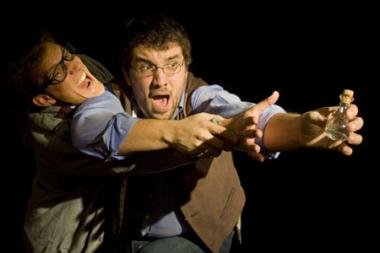“As a theater professional, I want to create theater that people can come and see, but I also want to be taking action to improve the real lives of women and girls around the world.” So says Kristen van Ginhoven, co-founder, with actor/educator Leigh Strimbeck, of WAM Theater.
The inspiration to create WAM last year came from a book: Half the Sky: Turning Oppression into Opportunity for Women Worldwide, the best-seller by Nicholas Kristof and Sheryl WuDunn. “They think the oppression of women and girls is the seminal moral issue of our time, as slavery was in the 19th century,” van Ginhoven says. “They also say we can’t all be Bill and Melinda Gates or Angelina and Brad, but a little bit can make a big difference.”
WAM stands for Women’s Action Movement. “We want action on behalf of women, and forward movement by and for women,” says van Ginhoven, who is directing the company’s production of Sarah Ruhl’s Melancholy Play, opening this weekend in Pittsfield.
The company’s objective is two-fold: to produce theater with a focus on women artists, and to donate a portion of the proceeds to organizations that work to create opportunities for women and girls, here and internationally. The performances of Melancholy Play will benefit the Women’s Fund of Western Massachusetts.
WAM’s mission tackles two injustices—not only the social, economic and political oppression of women around the world, but the scandalous lack of opportunity for women theater artists in the U.S., where a tiny percentage of professionally produced plays are written and/or directed by women. One shooting-star exception to this near-invisibility is Sarah Ruhl, who in this decade has become one of the most-produced American playwrights. Her quirky-poetic plays include The Clean House, Dead Man’s Cell Phone, Eurydice and In the Next Room or The Vibrator Play, which was nominated for a Pulitzer and multiple Tonys last year.
Melancholy Play is a perfect example of Ruhl’s protean approach to playwriting, “a nonlinear form of realism, full of astonishments, surprises and mysteries,” as one critic put it. The piece is “a contemporary farce” about sadness, a whimsical commentary on life in this vale of tears, in which one character is so exquisitely sad that everyone she meets is turned on by it, and where two (male) characters do battle over a vial of tears. In her production notes, the playwright advises, “Melancholy in this play is bold, outward, sassy, sexy and unashamed. … However, be sensitive to the moments of delicacy, fragility and sadness inside the farce.”
Van Ginhoven, a freelance director and actor who also teaches at Emerson College in Boston, says, “As professionals, we want to address the lack of equality for women theater artists. As women in the world, we want to address what Half the Sky is about. The book changed my mind about what we can achieve. In many places in the world, very little money can make an enormous difference to women’s lives. So we’re doing a little bit for the world and a little bit for our community.”
Melancholy Play: Nov. 12-14, 19-21, New Stage Performing Arts Center, 55 North Street, Pittsfield (above Beacon Cinema). Tickets $25/$12 students, www.wamtheatre.com or (800) 838-3006.



